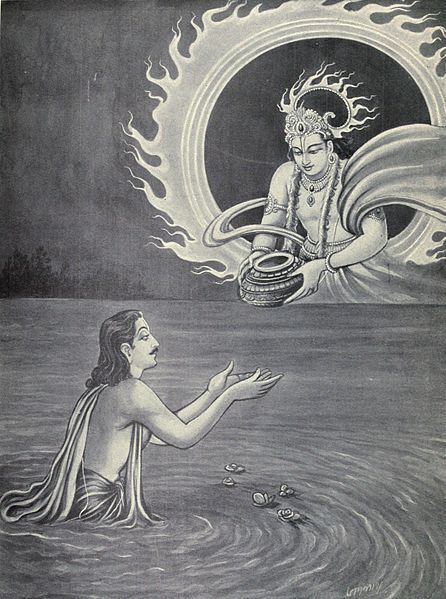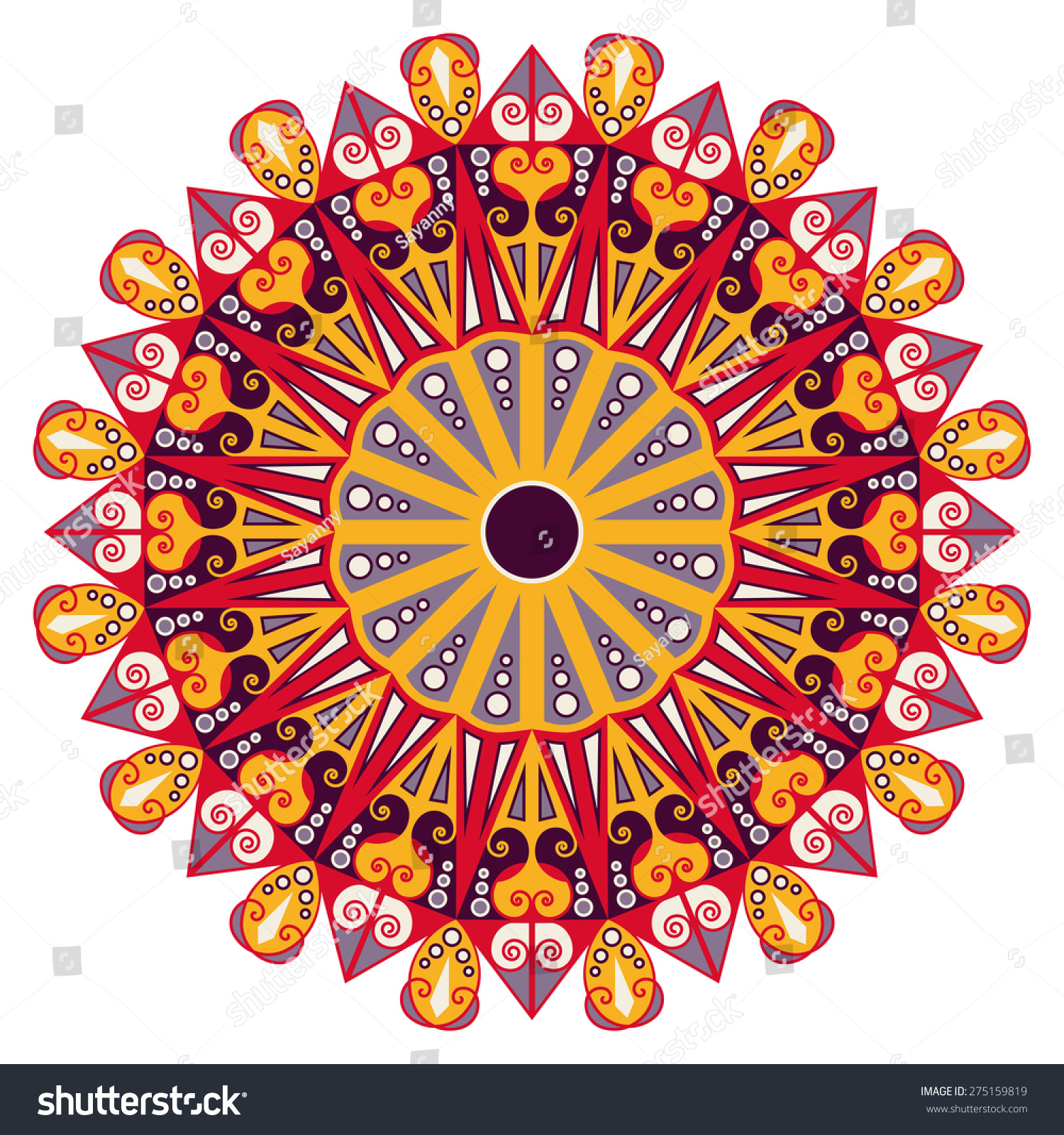Yudhishthira obtains a magic vessel from Sun God
 Yudhishthira approached his priest and in the midst of his brothers said:
Yudhishthira approached his priest and in the midst of his brothers said:
“The Brahmanas versed in the Vedas are following me who is departing for the forest. Afflicted with many calamities, I am unable to support them. I cannot abandon them, nor have I the power to offer them sustenance. O holy one! Tell me, what should I do in such a pass.”
After reflecting for a moment, seeking to find out the proper course by his yoga powers, Dhaumya addressed Yudhishthira, in these words:
“In days of old, all living beings that had been created were sorely afflicted with hunger. Like a father, Sun took compassion upon them. Going first into the northern declension, the Sun drew up water by his rays, and coming back to the southern declension, stayed over the earth, with his heat centered in himself. While the Sun so stayed over the earth, the lord of the vegetable world, the Moon, converting the effects of the solar heat vapours into clouds and pouring them down in the shape of water, caused plants to spring up. Thus it is the Sun himself, who, drenched by the lunar influence, is transformed, upon the sprouting of seeds, into holy vegetable furnished with the six tastes. It is these which constitute the food of all creatures upon the earth. Thus the food that supports the lives of creatures is instinct with solar energy, and the Sun is, therefore, the father of all creatures. Hence, O Yudhishthira! take refuge in him. All illustrious monarchs of pure descent and deeds are known to have delivered their people by practising high asceticism. The great Kartavirya, Vainya and Nahusha had all, by virtue of ascetic meditation preceded by vows, delivered their people from heavy afflictions. Therefore, as you are purified by the acts likewise you do, entering upon a file of austerities. Virtuously support the regenerate ones.
Listen to the one hundred and eight names of the Sun: Surya, Aryaman, Bhaga, Twashtri, Pusha, Arka, Savitri. Ravi, Gabhastiman, Aja, Kala, Mrityu, Dhatri, Prabhakara, Prithvi, Apa, Teja, Kha, Vayu, the sole stay, Soma, Brihaspati, Shukra, Budha, Angaraka, Indra, Vivaswat, Diptamshu, Shuchi, Shauri, Shanaischara, Brahma, Vishnu, Rudra, Skanda, Vaishravana, Yama, Vaidyutagni, Jatharagni, Aindhana, Tejasampati, Dharmadhvaja, Veda-karttri, Vedanga, Vedavahana, Krita, Treta, Dwapara, Kali, full of every impurity, Kala, Kastha, Muhurtta, Kshapa, Yama, and Kshana; Samvatsara-kara, Ashvattha, Kalachakra, Vibhavasu, Purusha, Shashvata, Yogin, Vyaktavyakta, Sanatana, Kaladhyaksha, Prajadhyaksha, Vishvakarma, Tamounda, Varuna, Sagara, Amshu, Jimuta, Jivana, Arihan, Bhutashraya, Bhutapati, Shrastri, Samvartaka, Vanhi, Sarvadi, Alolupa, Ananta, Kapila, Bhanu, Kamada, Sarvatomukha, Jaya, Vishala, Varada, Manas, Suparna, Bhutadi, Shighraga, Pranadharana, Dhanvantari, Dhumaketu, Adideva, Aditisuta, Dwadashatman, Aravindaksha, Pitri, Matri, Pitamaha, Swarga-dvara, Prajadvara, Mokshadvara, Tripishtapa, Dehakarti, Prashantatman, Vishvatman, Vishvatomukha, Characharatman, Sukshmatman, the merciful Maitreya. These are the hundred and eight names of Surya of immeasurable energy, as told by the self-create Brahma. For the acquisition of prosperity, I bow down to you, O Bhaskara, blazing like unto gold or fire, who is worshipped of the gods and the Pitris and the Yakshas, and who is adored by Asuras, Nisacharas, and Siddhas.
He who, with fixed attention recites this hymn at sunrise, obtains wife and offspring and riches and the memory of his former existence, and by reciting this hymn a person attains patience and memory. Let a man concentrating his mind, recite this hymn. By doing so, he shall be proof against grief and forest-fire and ocean and every object of desire shall be his.”
Having heard from Dhaumya these words suitable to the occasion, Yudhishthira, with heart concentrated within itself and purifying it duly, became engaged in austere meditation, moved by the desire of supporting the Brahmanas. Worshipping the maker of day with offerings of flowers and other articles, the king performed his ablutions. Standing in the stream, he turned his face towards the god of day. Touching the water of the Ganges, the virtuous Yudhishthira, with senses under complete control and depending upon air alone for his sustenance, stood there with rapt soul engaged in pranayama. Having purified himself and restrained his speech, he began to sing the hymn of praise to the Sun. Yudhishthira said:
“You are, O sun! the eye of the universe. You are the soul of all corporeal existences. You are the origin of all things. You are the embodiment of the acts of all religious men. You are the refuge of those versed in the Sankhya philosophy, and you are the support of the Yogins. You are a door unfastened with bolts. You are the refuge of those wishing for emancipation. You sustain and discover the world, and sanctify and support it from pure compassion. Brahmanas versed in the Vedas appearing before you, adore you in due time, reciting the hymns from the respective branches of the Vedas they refer. You are the adore of the Rishis. The Siddhas, the Charanas, the Gandharvas, the Yakshas, the Guhyakas, and the Nagas, desirous of obtaining boons follow your car coursing through the skies. The thirty-three gods with Upendra Vishnu and Mahendra, and the order of Vaimanikas have attained success by worshipping you. By offering you garlands of the celestial Mandaras, the best of the Vidyadharas have obtained all their desires. The Guhyas and the seven orders of the Pitris, both divine and human, have attained superiority by adoring you alone. The Vasus, the Rudras, the Sadhyas, the Marichipas, the Valakhilyas, and the Siddhas, have attained pre-eminence by bowing down unto you. There is nothing that I know in the entire seven worlds, including that of Brahma which is beyond you. There are other beings both great and endued with energy; but none of them has your lustre and energy. All light is in you, indeed, you are the lord of all light. In you are the five elements and all intelligence, and knowledge and asceticism and the ascetic properties. The discus by which the wielder of the Saranga humbles the pride of Asuras and which is furnished with a beautiful navel, was forged by Vishvakarman with your energy. In summer you draw, by your rays, moisture from all corporeal existences, plants and liquid substances, and pour it down in the rainy season. Your rays warm and scorch, and becoming as clouds roar and flash with lightning and pour down showers when the season comes. Neither fire nor shelter, nor woolen cloths give greater comfort to one suffering from chilling blasts than your rays. You illumine by your rays the whole Earth with her thirteen islands. You alone are engaged in the welfare of the three worlds. If you do not rise, the universe becomes blind and the learned cannot employ themselves in the attainment of virtue, wealth and profit. It is through your grace that the three orders of Brahmanas, Kshatriyas and Vaishyas are able to perform their various duties and sacrifices. Those versed in chronology say that you are the beginning and you the end of a day of Brahma, which consists of a full thousand Yugas. You are the lord of Manus and of the sons of the Manus, of the universe and of man, of the Manvantaras, and their lords. When the time of universal dissolution comes, the fire Samvartaka, born of your wrath, consumes the three worlds. Clouds of various hues begotten of your rays, accompanied by the elephant Airavata and the thunderbolt, bring about the appointed deluges. Dividing yourself into twelve parts and becoming as many Suns, you drink up the ocean once more with your rays. You are called Indra, you are Vishnu, you are Brahma, you are Prajapati. You are fire and you are the subtle mind. You are lord and the eternal Brahma. You are Hamsa, you are Savitri, you are Bhanu, Ansuman, and Vrishakapi. You are Vivaswan, Mihira, Pusha, Mitra, and Dharma. You are thousand-rayed, you are Aditya, and Tapana, and the lord of rays. You are Martanda, and Arka, and Ravi, and Surya and Sharanya and maker of day, and Divakara and Suptasushapti, and Dhumakeshin and Virochana. You are spoken of as swift of speed and the destroyer of darkness, and the possessor of yellow steeds. He that reverentially adores you on the sixth or the seventh lunar day with humility and tranquillity of mind, obtains the grace of Lakshmi. Those who adore and worship you with undivided attention are delivered from all dangers, agonies, and afflictions. Those that behold you who is everywhere, being the soul of all things living long, are freed from sin and enjoy an immunity from all diseases. O lord of all food! It beholds you to grant food in abundance unto me who is desirous of food for entertaining all my guests with reverence.”
 Thus the sun, purifier of the world, was adored by Yudhishthira. Pleased with the hymn, the Sun, maker of day, self-luminous, and blazing like fire showed himself to the son of Pandu and said:
Thus the sun, purifier of the world, was adored by Yudhishthira. Pleased with the hymn, the Sun, maker of day, self-luminous, and blazing like fire showed himself to the son of Pandu and said:
“You shall obtain all that you desire. I shall provide you with food for five and seven years together. O king! Accept this copper-vessel which I give unto you. As long as Panchali will hold this vessel, without partaking of its contents – fruits, roots, meat and vegetables cooked in your kitchen – these four kinds of food, from this day, shall be inexhaustible. On the fourteenth year from this, you shall regain your kingdom.”
Having said this, the god vanished away.
The one with the desire of obtaining a boon, who recites this hymn concentrating his mind with ascetic abstraction, obtains it from the Sun that he asks for, however difficult of acquisition it may be. The person, male or female, that recites or hears this hymn day after day, if he or she desires for a son, obtains one, and if riches, obtains them, and if learning acquires that too. The person male or female, who recites this hymn every day in the two twilights, if overtaken by danger, is delivered from it, and if bound, is freed from the bonds. Brahma himself had communicated this hymn to the illustrious Shakra, and from Shakra it was obtained by Narada and from Narada, by Dhaumya. Yudhishthira, obtaining it from Dhaumya, attained all his wishes. It is by virtue of this hymn that one may always obtain victory in war, and acquire immense wealth also. It leads the reciter from all sins, to the solar region.
Having obtained the boon, the virtuous son of Kunti, rising from the water, took hold of Dhaumya's feet and then embraced his brothers. Wending then with Draupadi to the kitchen, and adored by her duly, Yudhishthira Pandu set himself to cook their day's food. The clean food, however little, that was dressed, furnished with the four tastes, increased and became inexhaustible. With it, Yudhishthira began to feed the regenerate ones. After the Brahmanas had been fed, and his younger brothers also, Yudhishthira himself ate of the food that remained, which is called Vighasa. After Yudhishthira had eaten, Draupadi took what remained. After she had taken her meal, the day's food became exhausted.
Having thus obtained the boon from the Sun, Yudhishthira, himself as resplendent as that celestial, began to entertain the Brahmanas agreeably to their wishes. Obedient to their priest, Yudhishthira, on auspicious lunar days and constellations and conjunctions, performed sacrifices according to the ordinance, the scriptures, and the Mantras. After the sacrifices, he, blessed by the auspicious rites performed by Dhaumya and accompanied by him, and surrounded also by the Brahmanas set out for the woods of Kamyaka.
